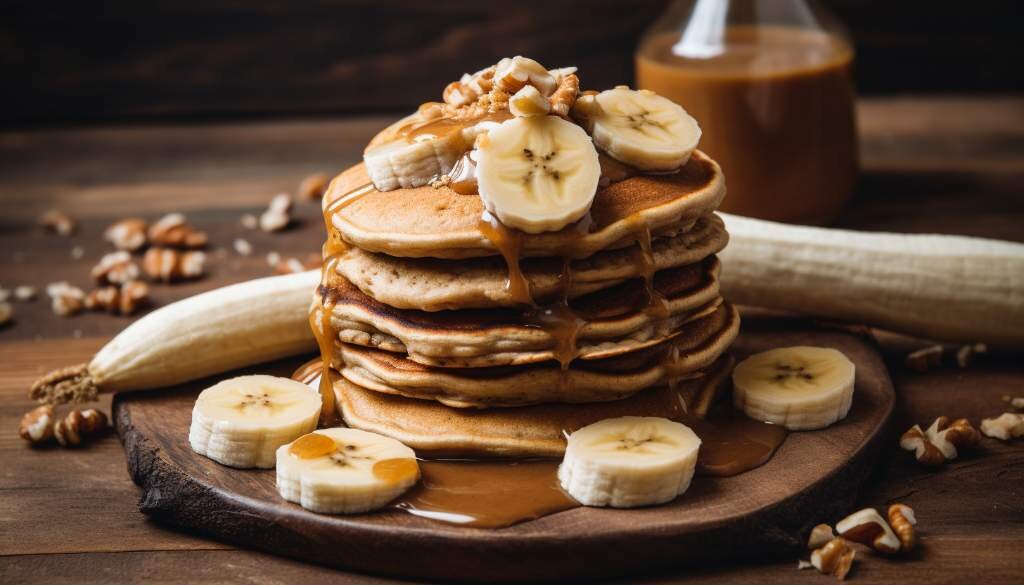
Introduction
Pancakes are a beloved breakfast food enjoyed by people all over the world. They are a type of flat, round cake made from a batter consisting of flour, eggs, milk, and a leavening agent. Pancakes can be sweet or savory and are typically cooked on a griddle or pan.In this article, we will explore the topic of pancake nutrition and whether or not pancakes are healthy. We will discuss the carbohydrates and energy provided by pancakes, the protein content, and the fiber they contain. We will also delve into the factors that can make pancakes unhealthy, such as high amounts of sugar and sodium, the use of refined flour, and unhealthy toppings.But don't worry, we won't leave you empty-handed! We will also provide you with some healthier alternatives to traditional pancakes, including whole grain pancakes, protein pancakes, and vegetable pancakes. Additionally, we will share some tips for making pancakes healthier, such as choosing a healthy pancake recipe, using whole wheat flour, and replacing sugar with natural sweeteners.So join us as we uncover the truth behind pancake nutrition and find out if this breakfast favorite can be a part of a healthy diet.
What are pancakes?
Pancakes are a popular breakfast food that is enjoyed by people all over the world. They are flat, round cakes made from a batter containing flour, milk, eggs, and a leavening agent such as baking powder. Pancakes can be sweet or savory, and they are typically cooked on a hot griddle or frying pan.
Traditionally, pancakes are made from refined flour, but there are also healthier alternatives available. Some people choose to use whole wheat flour instead of refined flour, which provides more fiber and nutrients. Others opt for gluten-free flours like almond flour or oat flour.
Common pancake toppings include maple syrup, butter, fruit, and whipped cream. However, these toppings are often high in sugar and calories. Healthier options for pancake toppings include fresh fruit, yogurt, nut butter, or a drizzle of honey.
Pancakes are loved for their versatility and ease of preparation. They can be customized with various mix-ins such as chocolate chips, blueberries, or cinnamon. Pancakes can also be made in different shapes and sizes, like mini pancakes or pancake muffins.
The popularity of pancakes
Pancakes are a beloved breakfast dish enjoyed by people all over the world. They are a popular choice due to their delicious taste, versatility, and ease of preparation. Pancakes are a type of flat, round, and fluffy cake made from a batter consisting of flour, eggs, milk, and a leavening agent such as baking powder or yeast.
One of the main reasons pancakes are so popular is their ability to be customized according to personal preferences. The basic pancake recipe can be enhanced with various flavors such as vanilla extract, cinnamon, or chocolate chips, making them suitable for different taste preferences. Additionally, pancakes can be topped with an assortment of delicious toppings, such as maple syrup, fresh fruits, whipped cream, or even savory options like cheese and bacon.
Pancakes are not only loved for their taste and versatility but also for their cultural significance. They have been a part of different cuisines for centuries, with variations found in various cultures across the globe. From American-style pancakes to French crepes, there is a pancake variation to suit every palate.
Furthermore, pancakes are often associated with special occasions and celebrations. They are a popular choice for breakfast on weekends or holidays, and many families have their own pancake traditions. Pancake houses, brunch spots, and breakfast cafes also offer diverse pancake options on their menus, further contributing to their popularity.
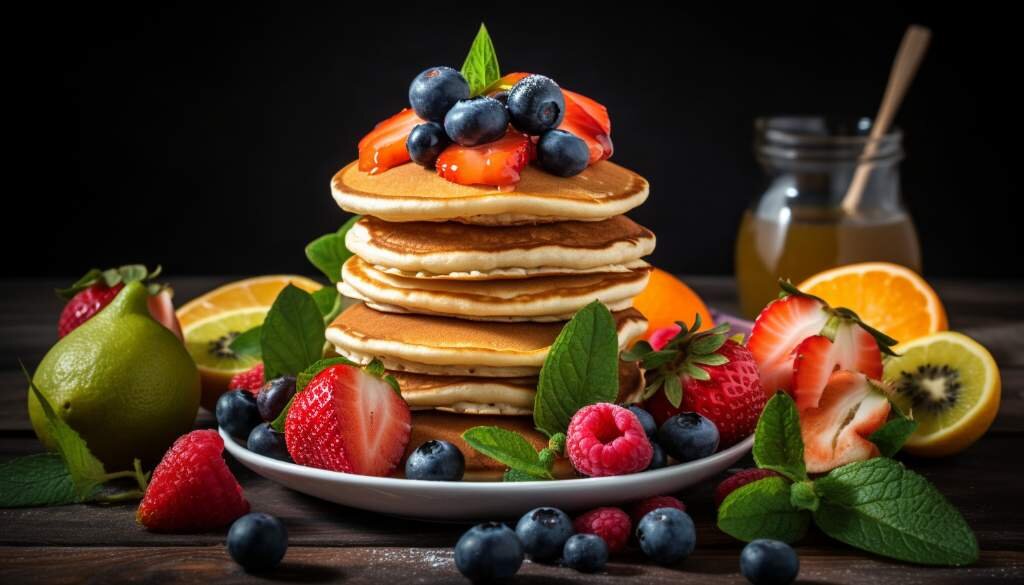
Pancake Nutrition
Pancake nutrition refers to the nutritional content of pancakes and how they contribute to your overall health and well-being. Pancakes are a popular breakfast food that are typically made from a batter consisting of flour, eggs, milk, and a leavening agent. While pancakes are delicious and satisfying, it's important to understand their nutritional value.
In the following sections, we will explore the various aspects of pancake nutrition. We will discuss the carbohydrates and energy provided by pancakes, the protein content they offer, and the fiber that can be found in pancakes. Additionally, we will look at what makes pancakes unhealthy, including the presence of sugar, sodium, and refined flour, as well as unhealthy toppings.
Furthermore, we will explore the concept of healthy pancake alternatives, such as whole grain pancakes, protein pancakes, and vegetable pancakes. These alternatives provide various nutritional benefits and can be a healthier option compared to traditional pancakes. Finally, we will provide some tips for making healthier pancakes, including choosing a healthy pancake recipe, using whole wheat flour as a substitution, and replacing sugar with natural sweeteners.
By understanding pancake nutrition and making informed choices, you can enjoy pancakes as part of a balanced diet and maintain a healthy lifestyle.
Carbohydrates and Energy
Carbohydrates are the main source of energy in pancakes. They provide the necessary fuel for your body to function properly. Pancakes are typically made with flour, which is a carbohydrate-rich ingredient. The flour is usually combined with milk, eggs, and butter to create a batter that is cooked into pancakes on a griddle or pan.
When you consume carbohydrates, your body breaks them down into glucose, which is then used by your cells to produce energy. The carbohydrates in pancakes provide a quick source of energy because they are easily and rapidly digested. This makes pancakes a popular choice for breakfast, as they can help kickstart your day.
However, it's important to note that pancakes made with refined flour can cause a rapid spike in blood sugar levels, followed by a crash. This can leave you feeling tired and sluggish. To avoid this, opt for pancakes made with whole grain flour, which contains more fiber and nutrients, and causes a slower and steadier release of glucose into the bloodstream.
In addition to providing energy, carbohydrates also play a role in supporting brain function. Your brain relies heavily on glucose for fuel, so consuming pancakes can help keep your brain functioning optimally.
Protein Content
Pancakes are a popular breakfast food enjoyed by people all around the world. They are typically made from a batter consisting of flour, eggs, milk, and a leavening agent, such as baking powder. When cooked on a hot griddle or frying pan, they form a delicious, round, and fluffy pancake.
When it comes to the nutritional content of pancakes, protein is an essential macronutrient that plays a vital role in our body. Although pancakes are not particularly high in protein compared to other foods, they do contain a moderate amount.
The protein content in pancakes comes mainly from the eggs used in the batter. Eggs are a fantastic source of high-quality protein, providing all the essential amino acids our body needs. By including eggs in pancake recipes, you can boost their protein content and make them more nutritious.
The exact amount of protein in pancakes can vary depending on the recipe and the size of the pancakes. On average, a standard serving of pancakes (about three pancakes) provides around 6-8 grams of protein. However, this may vary depending on the size and additional toppings or ingredients added to the pancakes.
While pancakes can contribute to your overall protein intake, they are not a significant source of protein. If you're looking to increase your protein intake, you might consider adding protein-rich toppings or incorporating other protein sources into your pancake recipe.
Adding toppings such as Greek yogurt, nut butter, or chopped nuts can help increase the protein content of your pancakes. These toppings not only add flavor but also provide additional protein, healthy fats, and other beneficial nutrients.
Alternatively, you can opt for protein pancakes, which are specially formulated to be higher in protein. Protein pancakes use ingredients like protein powder, cottage cheese, or Greek yogurt to increase the protein content significantly. These pancakes are an excellent option for individuals who are following a high-protein diet or looking to increase their muscle mass.
In conclusion, while pancakes do contain a moderate amount of protein, they should not be solely relied upon as a primary source of this macronutrient. Adding protein-rich toppings or opting for protein pancakes can help boost the protein content and make pancakes a more nutritious choice.
Fiber in Pancakes
Fiber is an essential nutrient that plays a crucial role in our overall health. When it comes to pancakes, incorporating fiber-rich ingredients can boost the nutritional value of this beloved breakfast food.
Fiber is a type of carbohydrate that our body cannot fully digest. Instead, it passes through the digestive system, providing a range of health benefits. Including fiber in your pancakes can help promote healthy digestion, maintain blood sugar levels, and support heart health.
One way to increase the fiber content in pancakes is by using whole grain flour. Unlike refined flour, whole grain flour retains the bran and germ, which are rich in fiber. Whole wheat, oat, or buckwheat flour are excellent choices for adding fiber to your pancakes. These flours not only boost the fiber content but also add a pleasant nutty flavor.
Apart from flour, you can also incorporate other fiber-rich ingredients into your pancake batter. Adding mashed bananas, applesauce, or grated zucchini can significantly increase the fiber content. These ingredients also add natural sweetness and moisture to the pancakes, reducing the need for additional sweeteners.
Another option is to top your pancakes with fiber-rich fruits. Blueberries, strawberries, and sliced bananas are excellent choices that not only add a burst of flavor but also contribute dietary fiber. You can also sprinkle some ground flaxseeds or chia seeds on top for an extra fiber boost.
By increasing the fiber content in your pancakes, you can make them more filling and nutritious, which can help in managing hunger and maintaining a healthy weight. Additionally, fiber-rich pancakes can provide a sustained release of energy, preventing sudden spikes and crashes in blood sugar levels.
In conclusion, incorporating fiber into your pancakes is a simple and effective way to improve their nutritional value. Whether through using whole grain flour, adding fiber-rich ingredients to the batter, or topping your pancakes with fiber-rich fruits and seeds, there are plenty of options to make your pancakes both delicious and healthy.
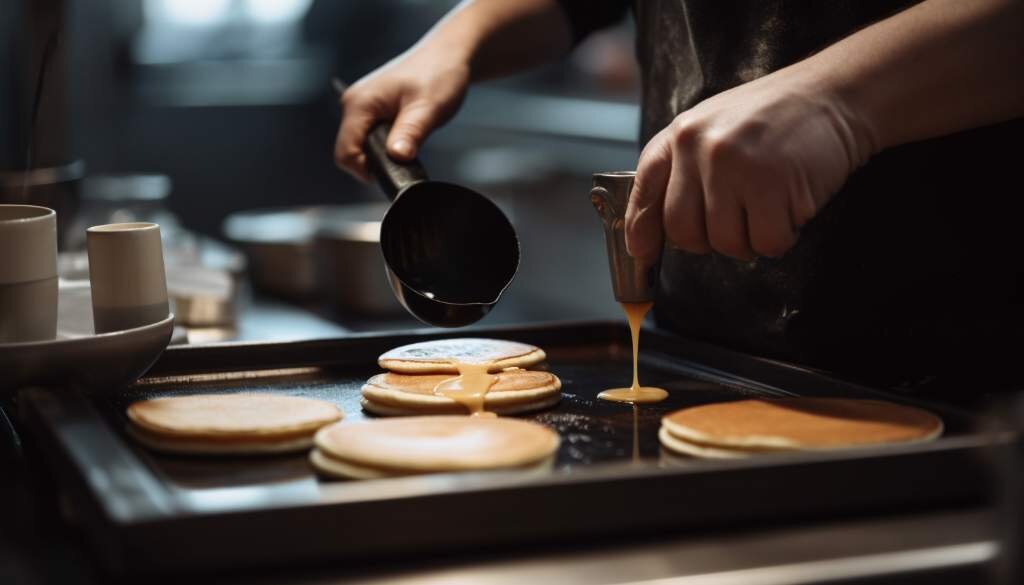
What Makes Pancakes Unhealthy?
Pancakes are a popular breakfast staple enjoyed by people all around the world. While they are undeniably delicious and comforting, it's important to understand that not all pancakes are created equal in terms of nutrition. In this section, we will explore the factors that can make pancakes unhealthy and provide insight into making healthier choices when indulging in this classic dish.
One of the main contributors to the unhealthy aspect of pancakes is the use of refined flour. Refined flour undergoes a milling process that removes the wheat germ and bran, stripping away essential nutrients such as fiber, vitamins, and minerals. This refined flour is often used to make the fluffy and light pancakes we're familiar with. Unfortunately, this can lead to a spike in blood sugar levels due to its high glycemic index, making it less ideal for those looking to maintain stable energy levels throughout the day.
Another culprit for unhealthy pancakes is the excessive use of sugar and sodium. Traditional pancake recipes often call for generous amounts of sugar to add sweetness to the batter, as well as sodium for flavor enhancement. Consuming too much added sugar can contribute to weight gain, tooth decay, and an increased risk of chronic diseases such as diabetes and heart disease. Similarly, excessive sodium intake can lead to high blood pressure and other health complications.
Lastly, the choice of toppings can also turn an otherwise healthy pancake into an unhealthy treat. Many people enjoy slathering their pancakes with sugary syrups, whipped cream, and sprinkles, which can significantly increase the calorie and sugar content of the meal. These toppings are often devoid of any nutritional value and can quickly negate any potential health benefits of the pancakes themselves.
In the following sub-sections, we will delve deeper into each of these factors that contribute to the unhealthiness of pancakes. We will explore the effects of sugar and sodium, the drawbacks of refined flour, and the impact of unhealthy toppings. By understanding these elements, we can make more informed choices when it comes to our pancake consumption. Let's dive in to learn more about the hidden drawbacks behind the beloved pancake.
Sugar and Sodium
Pancakes are often enjoyed as a delicious breakfast or brunch option. However, the truth is that they can be quite unhealthy due to certain factors, including the presence of sugar and sodium.
When it comes to sugar, pancakes can contain a significant amount, especially if they are sweetened with additional ingredients like maple syrup or honey. Consuming excessive amounts of sugar can lead to various health issues such as weight gain, diabetes, and increased risk of heart disease. It is essential to be mindful of the amount of sugar used in pancake recipes and consider healthier alternatives like using natural sweeteners such as stevia or fresh fruits.
Sodium is another concern when it comes to pancake nutrition. Commercially prepared pancake mixes often contain added salt, which contributes to the sodium content. Excessive sodium intake can lead to high blood pressure and increased risk of heart disease. To reduce sodium in pancakes, it is advisable to opt for homemade recipes where you have better control over the amount of salt used. Alternatively, you can experiment with herbs and spices to enhance the flavor without relying on excessive salt.
In conclusion, pancakes can be unhealthy due to the presence of sugar and sodium. It is important to be mindful of the ingredients used in pancake recipes to make healthier choices. By reducing the amount of sugar and sodium in your pancakes, you can enjoy this popular breakfast option without compromising your overall health.
Refined Flour
Refined flour is a key ingredient in traditional pancakes and has been widely criticized for its negative impact on health. Refined flour is made from processing grains, removing the bran and germ, which contain fiber, healthy fats, vitamins, and minerals.
The refinement process strips away essential nutrients, resulting in a product that is high in calories but lacking in nutritional value. When consumed in excess, refined flour can contribute to weight gain, blood sugar spikes, and increased risk of type 2 diabetes, heart disease, and other chronic conditions.
One of the primary concerns with refined flour is its effect on blood sugar levels. Due to its high glycemic index, refined flour is rapidly broken down into glucose, causing a quick surge in blood sugar levels. This can lead to energy crashes, cravings, and overeating.
In addition to its impact on blood sugar levels, refined flour is also associated with inflammation in the body. The refining process removes most of the fiber, which is responsible for regulating digestion and promoting gut health. Without fiber, refined flour is easily digested and absorbed, leading to a rapid release of glucose into the bloodstream and triggering an inflammatory response.
Furthermore, refined flour lacks the essential nutrients found in whole grains. It is low in dietary fiber, vitamins, and minerals, which are crucial for a balanced diet and overall health. By opting for foods made with refined flour, individuals may inadvertently miss out on important nutrients and increase their risk of nutrient deficiencies.
When it comes to pancakes, it's important to be mindful of the ingredients used in the batter. Many store-bought pancake mixes and restaurant pancakes contain refined flour. However, there are healthier alternatives available, such as whole grain flours or alternative flours like almond flour or oat flour.
By substituting refined flour with whole grain flour or alternative flours, pancakes can become a healthier option. These flours retain the fiber, healthy fats, vitamins, and minerals that are removed during the refining process. They provide greater satiety, promote stable blood sugar levels, and offer a more nutrient-dense alternative.
Unhealthy Toppings
Pancakes can be a delicious breakfast or brunch option, but they can quickly become unhealthy if topped with the wrong ingredients. Here are some popular unhealthy toppings to watch out for:
- 1. Syrups and sauces: Maple syrup and other flavored syrups may be tasty, but they are high in added sugars and can cause a spike in blood sugar levels. Similarly, chocolate sauce and other sweet sauces are often packed with sugar and unhealthy fats.
- 2. Whipped cream and butter: Adding dollops of whipped cream and slabs of butter to your pancakes can significantly increase their calorie and fat content. These toppings are high in saturated fats, which can contribute to heart disease and other health issues.
- 3. Powdered sugar: Sprinkling powdered sugar on your pancakes may seem harmless, but it is essentially pure added sugar. Consuming too much added sugar can lead to weight gain, diabetes, and other health problems.
- 4. Processed spreads: Avoid using processed spreads like margarine or hydrogenated vegetable oils on your pancakes. These spreads are high in unhealthy trans fats, which can increase bad cholesterol levels and raise the risk of heart disease.
- 5. High-calorie fruits: While fruits like bananas, strawberries, and blueberries can be a nutritious addition to your pancakes, be mindful of portion sizes. These fruits can be high in natural sugars and calories, so it's best to enjoy them in moderation.
When choosing toppings for your pancakes, consider healthier alternatives such as fresh fruits, Greek yogurt, nut butter, or a sprinkle of cinnamon. These options provide natural sweetness and added nutrients without the negative health effects of unhealthy toppings.
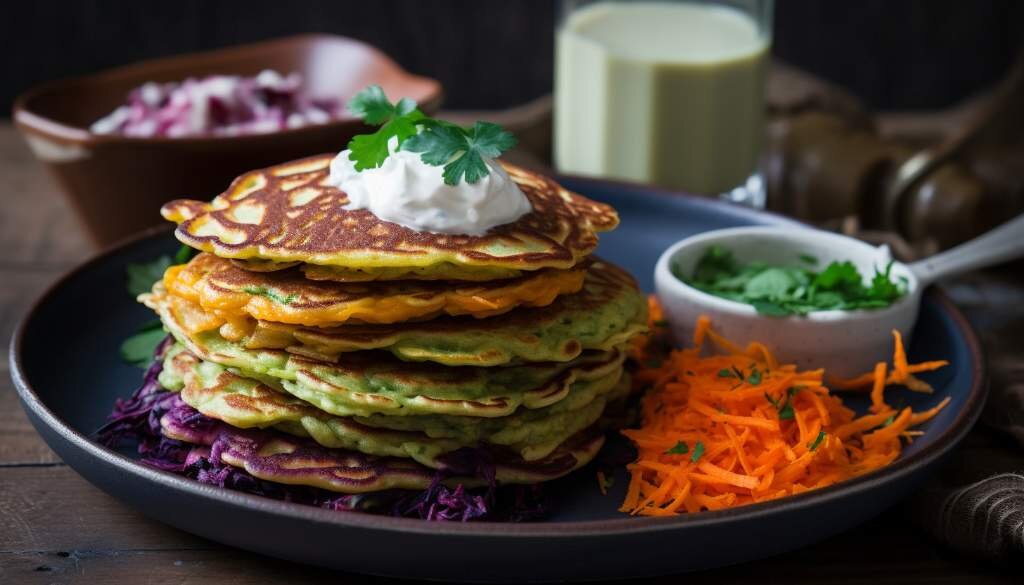
Are There Healthy Pancake Alternatives?
Are there healthy pancake alternatives? If you're a pancake lover but want to make healthier choices, there are several alternatives available. Let's explore some of these options and how they can provide a nutritious twist to your breakfast routine. In the following sub-sections, we will cover whole grain pancakes, protein pancakes, and vegetable pancakes. These alternatives offer different nutritional benefits and can be a great way to enjoy pancakes while maintaining a balanced diet. Let's dive in and discover these healthy pancake alternatives!
Whole Grain Pancakes
Whole grain pancakes are a healthy alternative to traditional pancakes made with refined flour. They are rich in essential nutrients and fiber, making them a nutritious choice for breakfast or brunch.
Whole grains are grains that contain all parts of the grain, including the bran, germ, and endosperm. This means that whole grain pancakes retain all the nutrients found in the original grain, such as vitamins, minerals, and antioxidants.
One of the main benefits of whole grain pancakes is their high fiber content. Fiber is important for digestive health and can help regulate blood sugar levels and promote satiety, keeping you full for longer. Whole grain pancakes can provide a significant amount of dietary fiber, contributing to your daily fiber intake.
When making whole grain pancakes, it's important to use whole wheat flour or other whole grain flours. These flours are made by grinding the entire grain, preserving all the nutrients and fiber. Whole wheat flour can be used as a 1:1 replacement for all-purpose flour in pancake recipes.
To enhance the flavor and nutritional profile of whole grain pancakes, you can add various ingredients to the batter. Consider adding mashed bananas, berries, or nuts for added sweetness, flavor, and nutrients. These additions can also increase the fiber and protein content of the pancakes.
When it comes to toppings, opt for healthier alternatives instead of sugary syrups or whipped cream. Fresh fruits like sliced strawberries or blueberries can add natural sweetness and antioxidants to your pancakes. You can also top your whole grain pancakes with a dollop of Greek yogurt or a drizzle of pure maple syrup for added protein and flavor.
Protein Pancakes
Protein pancakes are a popular alternative to traditional pancakes, especially among fitness enthusiasts and those looking to increase their protein intake. These pancakes are made with ingredients that are high in protein, providing a nutritious and satisfying breakfast or snack option.
Protein is an essential macronutrient that plays a crucial role in various bodily functions, including building and repairing tissues, producing enzymes and hormones, and supporting immune function. Incorporating protein into your pancakes can help you feel fuller for longer, regulate blood sugar levels, and support muscle recovery and growth.
The key ingredient in protein pancakes is, of course, protein powder. There are various types of protein powder available, including whey, casein, soy, and plant-based options like pea, hemp, and rice protein. These powders can be mixed with other ingredients such as eggs, milk (or plant-based milk), and flour to create a pancake batter.
One of the advantages of protein pancakes is that they can be customized to suit individual preferences and dietary needs. For those following a specific diet, such as a vegetarian or vegan diet, plant-based protein powders can be used. Additionally, people with lactose intolerance may opt for lactose-free protein powders or plant-based options.
Aside from protein powder, protein pancakes can be enhanced with other nutritious ingredients. By adding ingredients such as Greek yogurt, cottage cheese, nuts, seeds, or nut butter to the batter, you can further boost the protein content while also increasing the overall nutritional profile of the pancakes.
When it comes to cooking protein pancakes, the process is similar to making traditional pancakes. The batter is poured onto a hot griddle or skillet and cooked until bubbles form on the surface. Flip the pancake and cook for a few more minutes until it's cooked through.
Protein pancakes offer a tasty and healthy alternative to regular pancakes, providing a balanced meal option that is packed with protein. Incorporating these pancakes into your diet can be a great way to start the day or refuel after a workout, helping you meet your nutritional goals while enjoying a delicious and satisfying breakfast.
Vegetable Pancakes
Vegetable pancakes are a nutritious and delicious alternative to traditional pancakes. These pancakes are packed with vitamins, minerals, and fiber, making them a healthier choice for breakfast or brunch. Plus, they are a fantastic way to add more vegetables to your diet, especially for those who struggle to consume enough veggies throughout the day.
One of the great things about vegetable pancakes is that you can use a variety of vegetables to make them. Some popular options include grated zucchini, carrots, spinach, sweet potatoes, and corn. These veggies add not only nutritional value but also a vibrant and colorful twist to your usual pancake recipe.
To make vegetable pancakes, start by grating or finely chopping the vegetables of your choice. You can then mix them with the rest of the pancake batter ingredients, such as flour, eggs, and milk. Feel free to experiment with different seasonings and spices to enhance the flavor. You can also add some shredded cheese to give the pancakes an extra savory kick.
Vegetable pancakes are high in fiber, which is essential for a healthy digestive system. Fiber helps to regulate bowel movements, control blood sugar levels, and promote satiety, helping you feel fuller for longer. Additionally, the vegetables in these pancakes provide important vitamins and minerals, such as vitamin A, vitamin C, potassium, and iron.
Another benefit of vegetable pancakes is their relatively low calorie content compared to traditional pancakes. By using vegetables as a base, you can reduce the amount of refined flour in the recipe, making the pancakes lighter and healthier. They are also a great option for those following a gluten-free diet, as you can substitute regular flour with gluten-free alternatives like almond flour or chickpea flour.
To add some extra protein to your vegetable pancakes, you can include ingredients like Greek yogurt or cottage cheese in the batter. These protein-packed additions not only boost the nutritional value but also provide a creamy texture to the pancakes. You can also serve the vegetable pancakes with a side of scrambled eggs or a dollop of nut butter for a complete and balanced meal.
In conclusion, vegetable pancakes are a fantastic alternative to traditional pancakes when you're searching for a healthier breakfast or brunch option. With their vibrant colors, delicious flavors, and nutritional benefits, these pancakes are a great way to incorporate more vegetables into your diet. So, next time you're in the mood for pancakes, give vegetable pancakes a try and enjoy a tasty and nutritious meal.
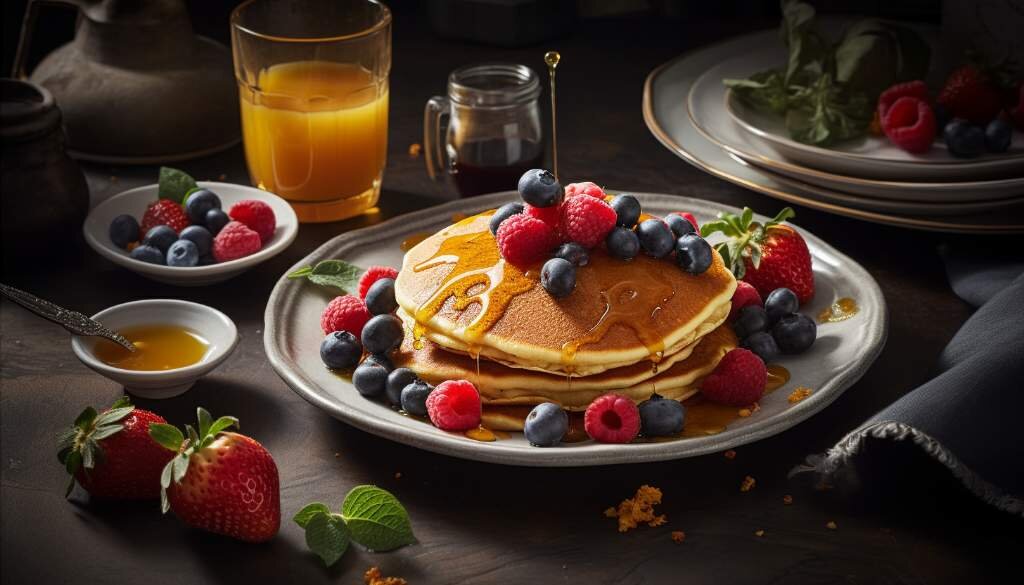
Tips for Making Healthier Pancakes
When it comes to enjoying pancakes, there are ways to make them healthier without compromising on taste. By making a few simple changes to your pancake recipe, you can create a nutritious and delicious breakfast option. In this section, we will explore some tips for making healthier pancakes.
Choosing a Healthy Pancake Recipe
When it comes to choosing a healthy pancake recipe, there are a few key factors to consider. By making a few simple substitutions and additions, you can transform traditional pancakes into a nutritious and satisfying breakfast option. Here are some tips for choosing a healthy pancake recipe:
- Opt for Whole Grain Flours: Instead of using refined white flour, choose recipes that include whole grain flours like whole wheat, spelt, or oat flour. Whole grain flours are higher in fiber and nutrients compared to their refined counterparts.
- Add Protein: To boost the nutritional value of your pancakes, consider adding a source of protein to the batter. This can be done by incorporating ingredients such as Greek yogurt, cottage cheese, or protein powder. Protein helps to keep you feeling fuller for longer and supports muscle repair and growth.
- Include Fruits and Vegetables: Adding fruits and vegetables to your pancake batter not only enhances the flavor but also provides an extra dose of vitamins, minerals, and fiber. Some popular options include mashed bananas, grated zucchini, or pureed pumpkin. Be creative and experiment with different combinations to find your favorite.
- Limit Added Sugars: Traditional pancake recipes often call for a significant amount of added sugars. To reduce the sugar content, consider using natural sweeteners like pure maple syrup or mashed ripe bananas instead. You can also try adding spices like cinnamon or nutmeg to enhance the sweetness without adding extra sugar.
- Reduce Unhealthy Fats: Many pancake recipes use butter or vegetable oil, which can contribute to excess saturated fat. To make your pancakes healthier, try substituting these fats with healthier options like coconut oil, avocado oil, or unsweetened applesauce. These alternatives provide healthier fats without compromising on taste.
- Experiment with Alternative Flours: If you have specific dietary needs or preferences, consider experimenting with alternative flours like almond flour, coconut flour, or buckwheat flour. These flours offer unique flavors and textures while being gluten-free and suitable for those following a low-carb or paleo diet.
By choosing a healthy pancake recipe, you can enjoy this classic breakfast staple without sacrificing your nutritional goals. Whether you prefer whole grain, protein-packed, or vegetable-based pancakes, there are plenty of options to suit your taste buds and dietary needs.
Using Whole Wheat Flour
Using whole wheat flour is a simple yet effective way to make your pancakes healthier. Whole wheat flour is a nutritious alternative to refined flours because it retains the bran and germ, which are rich in vitamins, minerals, and fiber. Here are a few reasons why you should consider using whole wheat flour when making pancakes:
- Nutritional Benefits: Whole wheat flour contains more fiber, protein, and nutrients compared to refined flours. Fiber helps regulate blood sugar levels, promotes healthy digestion, and aids in weight management. Additionally, whole wheat flour provides essential vitamins and minerals like iron, magnesium, and B vitamins, which are important for overall health.
- Lower Glycemic Index: Whole wheat flour has a lower glycemic index compared to refined flours. This means that consuming whole wheat pancakes can lead to a slower and more sustained release of glucose into the bloodstream, helping to maintain stable energy levels and reducing the risk of blood sugar spikes.
- Heart Health: Whole wheat flour is an excellent source of dietary fiber, which is beneficial for heart health. It can help lower cholesterol levels, reduce the risk of heart disease, and improve overall cardiovascular health.
To incorporate whole wheat flour into your pancake recipe, you can either replace all-purpose flour with an equal amount of whole wheat flour or use a combination of both. Keep in mind that whole wheat flour may result in slightly denser pancakes compared to those made with refined flour. You can also experiment with adding other nutritious ingredients like ground flaxseed or chia seeds to further enhance the nutritional value of your pancakes.
By using whole wheat flour in your pancake recipe, you can enjoy a healthier breakfast option without compromising on taste or texture. So go ahead and give it a try!
Replacing Sugar with Natural Sweeteners
Replacing sugar with natural sweeteners is a great way to make pancakes healthier without compromising on taste. Traditional pancakes often contain high amounts of refined sugar, which can contribute to weight gain, energy crashes, and other health issues. By using natural sweeteners, you can still enjoy delicious pancakes while reducing your intake of processed sugars. Here are some popular natural sweeteners that you can use as alternatives to sugar when making pancakes:
- Honey: Honey is a natural sweetener that not only adds sweetness but also provides additional health benefits. It contains antioxidants, enzymes, and minerals that can boost your immune system and improve digestion. When using honey as a pancake sweetener, opt for raw and unprocessed varieties to maximize its nutritional value.
- Maple Syrup: Maple syrup is another healthier option that you can use as a pancake sweetener. It is made by boiling down the sap of maple trees, making it a natural and unrefined sweetener. Maple syrup contains important minerals like manganese and zinc, as well as antioxidants. Look for pure maple syrup without any additional additives or artificial flavors.
- Stevia: Stevia is a zero-calorie sweetener that comes from the leaves of the stevia plant. It is a popular choice for people looking to reduce their sugar intake. Stevia is much sweeter than sugar, so a little goes a long way. It is also considered safe for people with diabetes as it doesn't affect blood sugar levels.
- Coconut Sugar: Coconut sugar is derived from the sap of coconut palm trees. It contains small amounts of essential nutrients such as iron, zinc, calcium, and potassium. Coconut sugar has a slightly caramel-like flavor and can be used as a 1:1 replacement for granulated sugar in pancake recipes.
When substituting sugar with natural sweeteners, keep in mind that they may have slightly different flavors and textures compared to refined sugar. It's always a good idea to experiment with different ratios and adjust the sweetness level to your preference. Remember, moderation is key, even when using natural sweeteners. While they are generally considered healthier alternatives, they should still be consumed in moderation to maintain a balanced diet.
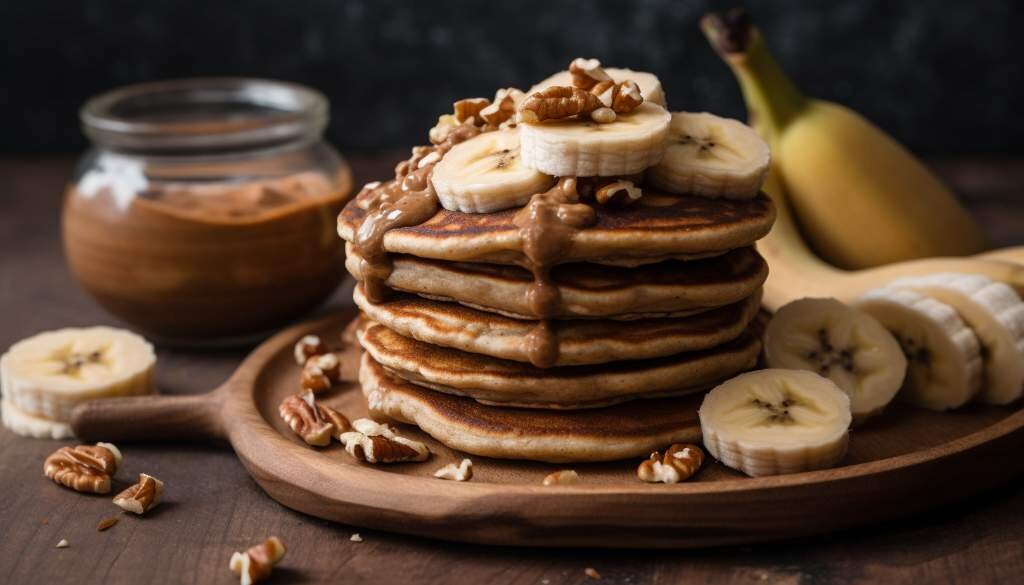
Conclusion
In conclusion, pancakes can be a part of a healthy diet when made with the right ingredients and consumed in moderation. While traditional pancakes made with refined flour and sugar may not be the healthiest option, there are healthier alternatives available. Whole grain pancakes are a great choice as they are rich in fiber and provide sustained energy. Protein pancakes, made with ingredients like protein powder or Greek yogurt, can be a good option for those looking to increase their protein intake. Vegetable pancakes, made with grated vegetables like zucchini or carrots, can also add nutrients to your pancake.
When making pancakes, there are several tips that can help you create a healthier version. Choosing a healthy pancake recipe that uses whole wheat flour instead of refined white flour can increase the fiber and nutrient content. Replacing sugar with natural sweeteners like honey or maple syrup can reduce the overall sugar content. Additionally, avoiding unhealthy toppings like sugary syrups and opting for fresh fruit or nut butter can make your pancakes healthier.
Remember, the key to enjoying pancakes while maintaining a healthy diet is moderation and making smart ingredient choices. As with any food, it is important to balance your pancake consumption with a variety of other nutritious foods to ensure you're meeting all your nutritional needs. So, go ahead and enjoy some delicious pancakes, but remember to make them a healthy part of your overall diet.








